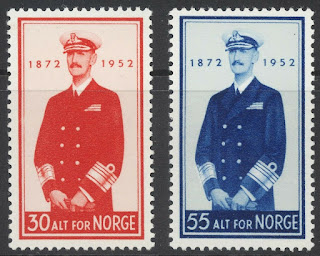Here are some events that happened on August 3rd. It could be an event or a person that died or was born on that day
1832 Born: Ivan Zajc, Croatian composer, conductor, and director (d. 1914)
Ivan Zajc (also Croatian: Ivan plemeniti Zajc, Italian: Giovanni de Zaytz; August 3, 1832 – December 16, 1914), was a Croatian composer, conductor, director, and teacher who dominated Croatia's musical culture for over forty years. Through his artistic and institutional reform efforts, he is credited with its revitalization and refinement, paving the way for new and significant Croatian musical achievements in the 20th century. He is often called the Croatian Verdi.
Yugoslavian stamps and first day cover depicting Ivan Zajc
1872 Born: Haakon VII of Norway (d. 1957)
Haakon VII (born Prince Carl of Denmark; 3 August 1872 – 21 September 1957) was the King of Norway from 1905 until his death in 1957.
Originally a Danish prince, he was born in Copenhagen as the son of the future Frederick VIII of Denmark and Louise of Sweden. Prince Carl was educated at the Royal Danish Naval Academy and served in the Royal Danish Navy. After the 1905 dissolution of the union between Sweden and Norway, Prince Carl was offered the Norwegian crown. Following a November plebiscite, he accepted the offer and was formally elected King of Norway by the Storting. He took the Old Norse name Haakon and ascended to the throne as Haakon VII, becoming the first independent Norwegian monarch since 1387.
Norway was invaded by Nazi Germany in April 1940. Haakon rejected German demands to legitimise the Quisling regime's puppet government and refused to abdicate after going into exile in Great Britain. As such, he played a pivotal role in uniting the Norwegian nation in its resistance to the invasion and the subsequent five-year-long occupation during the Second World War. He returned to Norway in June 1945 after the defeat of Germany.
He became King of Norway when his grandfather, Christian IX was still reigning in Denmark; and before his father and older brother became kings of Denmark. During his reign he saw his father, his elder brother Christian X, and his nephew Frederick IX ascend the throne of Denmark, in 1906, 1912, and 1947 respectively. Haakon died at the age of 85 in September 1957, after having reigned for nearly 52 years. He was succeeded by his only son, who ascended to the throne as Olav V.
Stamps from Norway depicting King Haakon VII
2008 Died: Aleksandr Solzhenitsyn, Russian novelist, dramatist and historian, Nobel Prize laureate (b. 1918)
Aleksandr Isayevich Solzhenitsyn (11 December 1918 – 3 August 2008) was a Russian novelist, philosopher, historian, short story writer and political prisoner. Solzhenitsyn was an outspoken critic of the Soviet Union and Communism and helped to raise global awareness of its Gulag labour camp system.
After serving in the Soviet Army during World War II, he was sentenced to spend eight years in a labour camp and then internal exile for criticizing Josef Stalin in a private letter. He was allowed to publish only one work in the Soviet Union, the novel One Day in the Life of Ivan Denisovich (1962). Although the reforms brought by Nikita Khrushchev freed him from exile in 1956, the publication of Cancer Ward (1968), August 1914 (1971), and The Gulag Archipelago (1973) beyond the Soviet Union angered authorities, and Solzhenitsyn lost his Soviet citizenship in 1974. He was flown to West Germany, and in 1976 he moved with his family to the United States, where he continued to write. With the dissolution of the Soviet Union, his citizenship was restored in 1990, and four years later he returned to Russia, where he remained until his death in 2008.
He was awarded the 1970 Nobel Prize in Literature "for the ethical force with which he has pursued the indispensable traditions of Russian literature". His The Gulag Archipelago was a highly influential work that "amounted to a head-on challenge to the Soviet state" and sold tens of millions of copies.
Russian stamp depicting Aleksandr Solzhenitsyn






No comments:
Post a Comment